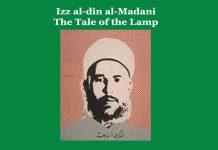Layla al-Uthma | Night of Torment | An Analytical Study
–Menonim Menonimus
Layla al-Uthma | Night of Torment | An Analytical Study
Layla al-Uthma | Night of Torment | An Analytical Study
‘Night of Torment’ is a Kuwaiti Arabic short story written by Lyla al-Uthman (born 1945). The story deals with the theme of conflict of interest (choice) of man and woman.
The short story has no specific plot but only characterization. The author has mentioned the names of the characters nowhere in the story. However, the main character is an attendant in the ladies’ room at the airport. She is very fond of perfume and wishes to please and draw the attention of her husband to her by means of using perfumes on her whole body.
Her duty is to take care of the ladies’ room in the airport. On a particular day, she started her work by picking up the piece of paper scattered on the floor and left those on the lids of the bins. Then she checked the white washbasins, cleaned the scum left on the sides with a brush and poured a little Dettol down the plughole, tidied up the loose toilet rolls and gently readied the washroom for the hasty passengers. She would return to her chair hopefully awaiting the generosity of some of the women. All the time she was dreaming of having a bottle of perfume for herself. After the work of the day she went out into the street and felt the combined smell of exhaust fumes of people. As soon as she opened the door to the wretched annex where she lived, she smelled the suppressed odours rushing towards her like gaping maws, dispelling the street smells and thus leaving only the lavatory odour on her body and clothes. Night of Torment
At night she would be engulfed in grief and besieged by the image of women clad in their expensive accessories and fashionable clothes. She would slowly exhale in an attempt to catch the slightest whiff of the ladies’ perfumes. However, they soon clashed with the smell of her snoring husband, lying next to her. She filled her lungs with the oily smell of sambousak and potato kibbeb which her husband had eaten in the Indian restaurant where he works. She would suppress her overwhelming grief: “Surely he must smell the toilet odours on me.”
Her husband was negligent and inattentive to her. She desired to have his attention and favour by spraying perfumes on her body. She is often carried away by her desire, imagining herself holding a perfume bottle, making her most hidden dreams come true. She thought within herself, “If I spray some of these fragrances on me, all our bad smells will vanish, and we will embrace each other tightly.”
The moment she decided to put on the perfume, the bottle she was holding in her hands turned into something an insect spray pursuing the buzz of a dull fly, she became the fly whizzing around and spraying herself randomly, not caring what she sprays, whether it be parts of her body, her hair or her garments. The sound of the atomizer spray mixed with her laughter, singing and sighs of incipient delight. She emptied the entire bottle, apart from a little bit that remained at the bottom that could be reached by the siphon. She was determined not to leave a single drop; with a pestle she broke the bottleneck, extracted the last drop and applied them to her hair and cheeks, oblivious to the small pieces of broken glass that were scratching her. Night of Torment
She decided not to do any work. She made herself comfortable on the cotton bed and relaxed with the knowledge that he (her husband) would come from his work and slip into her bed. She felt his head twisting and turning, like someone chasing away silly ideas. He kicked with his legs as though pushing away a mouse or a cockroach that had climbed onto them. Then she heard him sniffing like someone trying to ascertain the source of a particular smell. She realized that he had discovered a new smell. She was under the illusion that he was aroused by her. In her conceit, she moved close to him and grabbed his back. He shook but did not turn towards her. She pounced on him, her body on top of his, confident that he would reciprocate, attracted by her perfume and lusting for her body. Instead, he sighed twice and rolled over to the side she had vacated. He was restless while his breathing came close to sneezing. She started to have doubts about the perfume. She thought, “Is it possible that no one other than the person wearing the perfume can smell it, or has he got cold.”
Suddenly he turned toward her. Her heart sang, her body shuddered and her hunger grew, but in that brief moment, her smile evaporated and her dream shattered and his dream hit her like a plague. “You smell horrible tonight. I cannot stand it! Go and wash!”
She felt as though her body was falling into a deep well from which rose the stench of filled lavatories. The smell from the soles of her feet swept to the rest of her body. Removing any traces of the perfume.
Thus the author has portrayed the conflict of interest between man and woman.
There are three characters the main is the woman who tries her best to draw the attention of her husband by means of using perfume on her whole body. She may be the type of woman who is very conscious of having the affection of their husbands. But in spite of her all attempts she fails to draw her husband’s attention to her and experienced great mental suffering.
As there is no specific plot, the structure of the story hardly conforms to the norms of a good short story. Most of the inner characterization of the lady mad of attracting her husband happens in her daydream regarding the use of perfume and its magic action. But in reality, it happens just the dire opposite. However, the story comes to an end with an ironic surprise.
The setting of the story is a busy airport which has been delineated vividly in the story.
The language of the story is characteristic of Kuwaiti Arabic as the abundance use of long and complex sentences and full of imagery. The author has enriched her language by using some fascinating similes and metaphors as:
“… even though you were sweeter than an apple and fresher than a rose.” (simile)
“This perfume is truly a magic.” (metaphor)
“You flapped about helplessly like a fish.” (simile)
“She thought of the treasure of her bag, took it out and cupped it in her palms, like a mother cradling her child’s head.” (simile)
The Dialogue used in the story is appropriate to the characters and situation, especially the dialogue of the lady who has succeeded to express her inner mind.
The author expresses her philosophy of life that the taste of a man differs from a woman.
The story is written in the third person where the author keeps her characters anonymous.
In representing the story the author has succeeded as the purpose of the motives of the author is maintained throughout the story. 0 0 0 Night of Torment
Night of Torment
Read More: Izz al-din al-Madani Short Story ‘The Tale of the Lamp’-An Analytical Study
Night of Torment
N. B. This article entitled ‘Layla al-Uthma | Night of Torment | An Analytical Study’ originally belongs to the book ‘Analytical Studies of Some Arabic Short Stories‘ by Menonim Menonimus. Night of Torment
Books of Literary Criticism by M. Menonimus:
- World Short Story Criticism
- World Poetry Criticism
- World Drama Criticism
- World Novel Criticism
- World Essay Criticism
- Indian English Poetry Criticism
- Indian English Poets and Poetry Chief Features
- Emily Dickinson’s Poetry-A Thematic Study
- Walt Whitman’s Poetry-A Thematic Study
- Critical Essays on English Poetry
- Tawfiq al-Hakim’s Novel: Return of the Spirit-An Analytical Study
- Tawfiq al-Hakim’s Novel: ‘Yawmiyyat Naib Fil Arayaf’-An Analytical Study
- Analytical Studies of Some Arabic Short Stories
- A Brief History of Arabic Literature: Pre-Islamic Period …
Related Searches:











